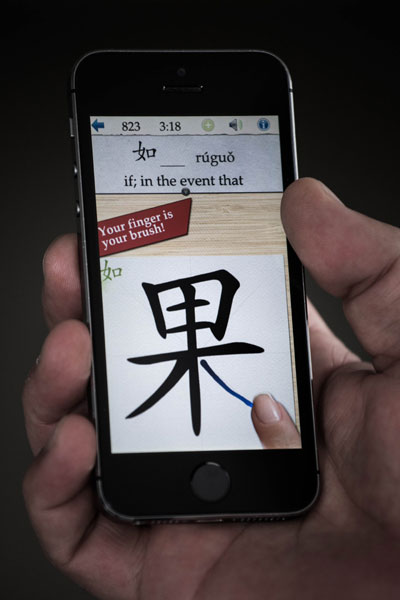 |
|
The language app Skritter. More language learning apps are using tricks traditionally employed by online games to hook users. Philippe Lopez/AFP |
Gripping the German journalist's attention was not Candy Crush, but one of a new generation of Chinese language apps that are using tricks traditionally employed by online games to get users hooked on learning.
For years the thrill of studying a new language has been tempered by the tedium of rote learning and repetition required to be truly accomplished-particularly the case for memorizing a character-based system. However, language apps are now increasingly turning to the same praise, reward and challenge format used by popular games such as Candy Crush.
Shanghai-based Mattheis is an avid user of Memrise, an app that offers courses in standard Mandarin and several dialects and has 25 million users.
"We've turned learning into a game where you grow a garden of memory," the firm said. The premise being that when users learn words, they plant virtual seeds that grow and bloom the more they review and practice. If they forget, then reminders are sent that their buds of knowledge are wilting.
"It's so quick, it doesn't feel like any effort," Mattheis said. "I learned a few hundred characters without really trying."
Memrise, along with rivals Skritter and ChineseSkill, feature interactive tools that entertain as well as teach-a trend known as "gamification"-pioneered by the big daddy of education apps, DuoLingo.
"In a lot of Western countries, we now see ourselves as competitive with Candy Crush," said Gina Gotthilf, a DuoLingo spokeswoman. "We want to be a very popular game and we want people to play when they're bored."
Ben Whately, who worked on Memrise's Chinese courses, said, "Candy Crush is effective because it adjusts the difficulty level to just the right level for you.
"Adapting to a level where people feel clever is a great way to keep them playing. That is exactly what our learning algorithm does: adjusts when you are tested so that you always have to struggle a little bit, but you are generally successful."
Users commit Chinese characters and definitions to memory with the help of animations and mnemonics, and they are notified to review the characters each time they are just at the point of forgetting them, a technique known as "spaced repetition".
A lesser-considered obstacle is learning to write characters correctly, a time-consuming technique that greatly enhances one's ability to remember them.
Skritter instructs users on the order and direction of strokes with bright graphics and feedback that flashes when you miss, recalling another popular game called Fruit Ninja.
A key question is whether these methods work any better than traditional immersion in a native-speaking environment or a traditional classroom.
"People sometimes think they can take the easy route of using flashcards and dictionaries to learn Chinese, but that is 100 percent not the case," said Hong Kong-based businessman Brad Jester, who has become a fluent speaker.
"Until these apps shame you into studying harder, they will just be helpful tools that reinforce lessons learned."
